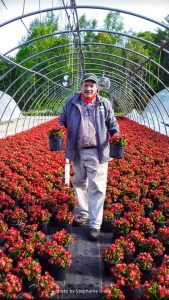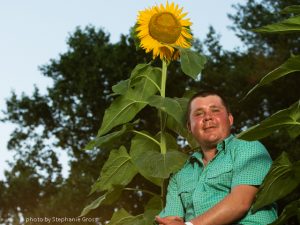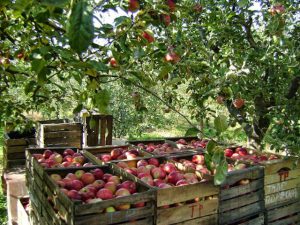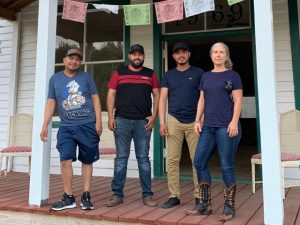Nelson County Farmers and Workers Join Forces to Fight Covid, Protect Communities
Pick up a firm, tart apple or a plump, juicy peach at the local farm market and you might consider the hard work that went into growing, picking, and delivering that fresh bounty. Over this last year, Nelson County growers and the seasonal farm workers they depend on worked extra hard to plan strategically to protect the migrant and local communities from contracting COVID-19.
Thanks to a unique collaboration between local growers and a newly created nonprofit advocating for workers’ health and welfare, 97 percent of the seasonal and migrant workforce was vaccinated against COVID-19, avoiding any outbreaks of the virus among workers in 2021.
“Our biggest challenge was trying to keep COVID out of our workforce. We were very fortunate that we did not have any cases in our immigrant workforce,” said Jim Saunders of Saunders Brothers, Inc., Nursery and Fruit Orchards.
 Migrant workers with H-2A visas who arrive annually from Mexico form a critical link in the local food production chain. The onset of the COVID pandemic in mid-2020, threatened growers’ international access to seasonal farmworkers as well as raising safety and wellness concerns for the local community. The problems facing growers included screening migrant workers at the U.S. border before transporting them and educating and monitoring them on mask-wearing and hygiene practices to avoid infection. Most important was to explain the risks of contracting COVID and to encourage the farmworkers to become vaccinated.
Migrant workers with H-2A visas who arrive annually from Mexico form a critical link in the local food production chain. The onset of the COVID pandemic in mid-2020, threatened growers’ international access to seasonal farmworkers as well as raising safety and wellness concerns for the local community. The problems facing growers included screening migrant workers at the U.S. border before transporting them and educating and monitoring them on mask-wearing and hygiene practices to avoid infection. Most important was to explain the risks of contracting COVID and to encourage the farmworkers to become vaccinated.
Enter the Central Virginia Farm Workers Initiative (CVFWI), created by local migrant worker welfare advocate Vanessa Hale. Supported in part by a grant from the nonprofit Nelson County Community Fund, Inc. (NCCF), the CVFWI worked with leading growers to form the Nelson County 2021 COVID Mitigation Collaboration project.
“The NCCF grant was the first one CVFWI got, and it allowed us to jump in and achieve the goal of having every farm worker in Nelson County—who are essential workers—protected from COVID-19,” said Hale. “These are the men that are picking our fruits and vegetables and allowing us to have food on the table. They’re also part of our community, and it’s a question of protecting the public health in general.”
“Where Vanessa really helped was in educating our workers [about COVID], and in getting past language and cultural barriers,” said Saunders. “She was very instrumental in the planning and coordination of the whole vaccine program.” Although he did not require his farmworkers to be immunized, Saunders said all became fully vaccinated, including the two-thirds of workers who travel annually from Mexico. He added that plans are already underway to give COVID-19 vaccine boosters to migrant workers who went back to Mexico at the end of the last season and will return to Nelson County this spring.
 The collaboration project coordinated with the Virginia Department of Health’s Blue Ridge Health District to conduct five mass vaccination events in 2021, inoculating hundreds of farmworkers. CVFWI also distributed cloth face masks and coats. CVFWI continues to conduct health advocacy sessions for workers in Spanish, as well as coordinating and interpreting for individual workers needing medical care.
The collaboration project coordinated with the Virginia Department of Health’s Blue Ridge Health District to conduct five mass vaccination events in 2021, inoculating hundreds of farmworkers. CVFWI also distributed cloth face masks and coats. CVFWI continues to conduct health advocacy sessions for workers in Spanish, as well as coordinating and interpreting for individual workers needing medical care.
“Vanessa’s group [CVFWI] helped a lot with visiting our guys. They had a lot of questions and hesitancy about getting the vaccine. Having a third party get involved, who spoke their language, really helped,” said Carter Parr of Seamans’ Orchard.
He added that once his second wave of workers arrived later in the season word of the vaccine’s safety had spread and there was little hesitancy among workers to get it. “I believe it was good planning, plus a little luck, that we avoided COVID all together.”
 The COVID mitigation collaboration between the growers, CVFWI, and the Blue Ridge Health District “has come a long way,” agreed Ruth Flippin Saunders of Silver Creek Orchards, Inc. A number of her full-time Hispanic workers suffered a COVID outbreak in 2020, before the vaccine became available. She was deeply concerned about the risk to her incoming migrant workers. Now all of her workers who have been vaccinated also received the booster, she added.
The COVID mitigation collaboration between the growers, CVFWI, and the Blue Ridge Health District “has come a long way,” agreed Ruth Flippin Saunders of Silver Creek Orchards, Inc. A number of her full-time Hispanic workers suffered a COVID outbreak in 2020, before the vaccine became available. She was deeply concerned about the risk to her incoming migrant workers. Now all of her workers who have been vaccinated also received the booster, she added.
While CVFWI primarily focuses on the welfare of seasonal migrant workers, Ruth Saunders noted that its proactive support reverberates throughout the local immigrant community. “Vanessa does a great job for the Hispanic community. She is committed and believes in what she does, and they believe in her and trust her.”
Click this link to read other interviews with other beneficiaries of the NCCF.
CVFWI: A Voice for Migrant Farm Workers
In a battered clapboard building that once housed the Odd Fellows Lodge in Massies Mill, VA, three Latino men listen intently to a petite woman as she speaks rapidly, switching effortlessly between English and Spanish.
 It is a typical scene for Vanessa Hale, whose clients are the migrant and seasonal farmworkers whom local growers depend on to harvest their crops. A longtime migrant wellness advocate, Hale started the Central Virginia Farm Workers Initiative (CVFWI) in 2020 in part to respond to the challenge of protecting workers from COVID-19. Hale and her staff played a critical role in ensuring that nearly all of the seasonal workforce was vaccinated against COVID.
It is a typical scene for Vanessa Hale, whose clients are the migrant and seasonal farmworkers whom local growers depend on to harvest their crops. A longtime migrant wellness advocate, Hale started the Central Virginia Farm Workers Initiative (CVFWI) in 2020 in part to respond to the challenge of protecting workers from COVID-19. Hale and her staff played a critical role in ensuring that nearly all of the seasonal workforce was vaccinated against COVID.
Hale and the Latino farmworkers sat down with NCCF to discuss the COVID mitigation experience partially funded through an NCCF grant. While Hale translated, farmworker Miguel Angel Barajas Manzo admitted that “We had a lot of doubts about [getting] the vaccine. Some people had health problems and were taking medicines. Also, we were worried about getting sick and not having family here with us.”
That is when CVFWI stepped in to meet with farmworkers both during their journey from the U.S./Mexico border and in the migrant camps after they arrived. CVFWI staff and volunteers educated the workers about the disease and vaccine but took their support even further by helping organize mass vaccine events.
“Vanessa got the vaccine first and showed us. She didn’t get sick—she didn’t die. So, we trusted it. Now, I would even tell my family, if they were here, to get vaccinated,” said longtime seasonal worker Daniel Bobadilla Espinoza.
CVFWI’s support continues well beyond COVID education efforts, helping coordinate health care visits for workers, and providing bilingual interpretation on everything from tax issues, to insurance, to obtaining a driver’s license.
“A lot of times [CVFWI] will help us with some situations we do not have information about. It’s good to have an advocate, someone to explain,” said Alfonso Meilo Diaz.
The language barrier is a huge challenge for both workers and growers, Hale agreed, and one that CVFWI is targeting next, along with digital literacy.
“A lot of workers would be very interested in learning English,” said Espinoza who participated in a CVFWI pilot project to take English language classes online. But few workers have access to computers and Internet connectivity.
Lack of Internet access and/or the skills to navigate digital information remains an obstacle to expanding COVID education as well as improving workers’ quality of life. Many migrant farmworkers spend three-quarters or more of each year in Nelson County. “They really are full-time members of the community,” said Hale.
